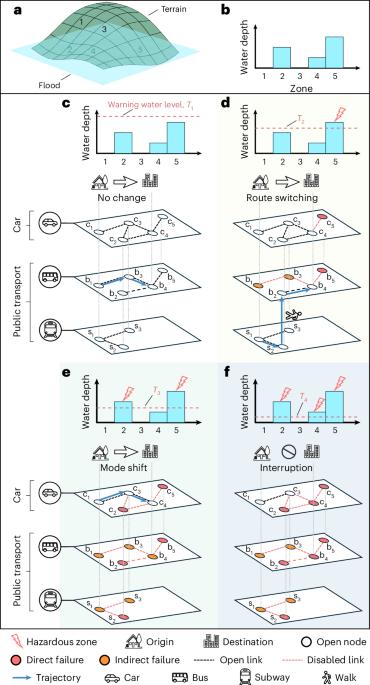Adaptive capacity for multimodal transport network resilience to extreme floods
IF 27.1
1区 环境科学与生态学
Q1 ENVIRONMENTAL SCIENCES
引用次数: 0
Abstract
As extreme weather events enhanced by climate change pose challenges to the resilience of critical infrastructure, the ability to handle disruptions, avoid tipping points, adapt and transform in crises becomes essential. Despite advances in resilience research, there is a need to improve empirical evidence and mathematical models to quantify the systems’ adaptive capabilities to extreme climate-related phenomena, such as floods. This research fills this gap by integrating an agent-based multimodal traffic functional model with a compound failure model to provide valuable insights into adaptation patterns (that is, mode shift and route switching) and risk mitigation in response to flood-related disruptions. The proposed modelling approach not only quantifies the recovery and adaptive capacity against failures, going beyond traditional resilience analyses, but also unveils the key factors that drive adaptation of transportation to flood-induced disasters. These factors include variations in trip demand and network density, which together reveal a universal law of mode shift. The study provides valuable insights into the design of resilient and sustainable critical infrastructure systems, such as transportation, energy and communication systems capable of withstanding severe flood events while maintaining their functionality. Extreme weather events will require resilient and adaptive critical infrastructure. This study models adaptive transitions in collective travel behaviour during flood events across different cities to quantify recovery and adaptive learning from failures and reveal adaptation drivers.

多式联运网络应对极端洪水的适应能力
随着气候变化加剧的极端天气事件对关键基础设施的复原力构成挑战,处理中断、避免临界点、在危机中适应和转型的能力变得至关重要。尽管复原力研究取得了进展,但仍需要改进经验证据和数学模型,以量化系统对极端气候相关现象(如洪水)的适应能力。本研究通过将基于代理的多模式交通功能模型与复合故障模型相结合,填补了这一空白,为应对洪水相关中断的适应模式(即模式转换和路线切换)和风险缓解提供了有价值的见解。提出的建模方法不仅量化了对失败的恢复和适应能力,超越了传统的恢复力分析,而且揭示了推动交通适应洪水灾害的关键因素。这些因素包括出行需求和网络密度的变化,它们共同揭示了模式转换的普遍规律。该研究为弹性和可持续的关键基础设施系统的设计提供了宝贵的见解,例如能够承受严重洪水事件的运输,能源和通信系统,同时保持其功能。极端天气事件需要有弹性和适应性的关键基础设施。本研究对不同城市洪水期间集体出行行为的适应性转变进行了建模,以量化从失败中恢复和适应性学习,并揭示适应驱动因素。
本文章由计算机程序翻译,如有差异,请以英文原文为准。
求助全文
约1分钟内获得全文
求助全文
来源期刊

Nature Sustainability
Energy-Renewable Energy, Sustainability and the Environment
CiteScore
41.90
自引率
1.10%
发文量
159
期刊介绍:
Nature Sustainability aims to facilitate cross-disciplinary dialogues and bring together research fields that contribute to understanding how we organize our lives in a finite world and the impacts of our actions.
Nature Sustainability will not only publish fundamental research but also significant investigations into policies and solutions for ensuring human well-being now and in the future.Its ultimate goal is to address the greatest challenges of our time.
 求助内容:
求助内容: 应助结果提醒方式:
应助结果提醒方式:


